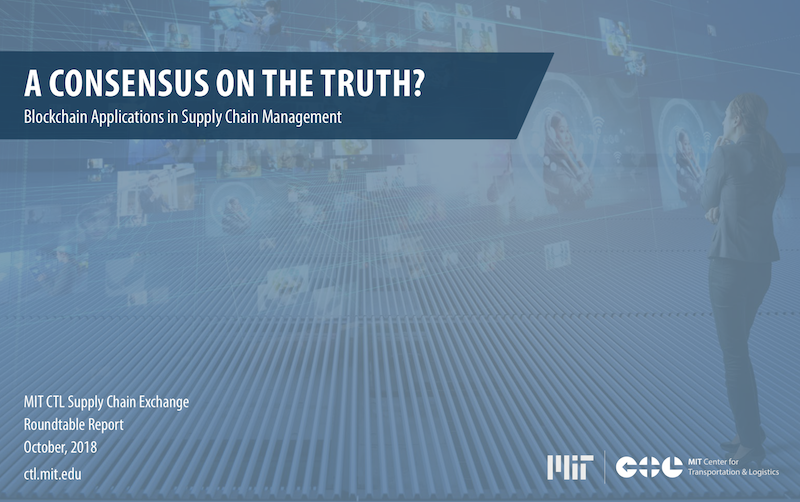Representatives from nine manufacturers, eight transportation companies, eight startups, a retailer, and an industry association joined experts from MIT for a highly interactive one-and-a-half-day roundtable on the use of blockchain technology in the supply chain. A variety of industries were represented, including healthcare, aerospace, food, mining, electronics, chemical, fashion, and logistics.
The first half-day consisted of a series of lectures focused on blockchain technology itself, to give participants a basic understanding and a common language for subsequent discussions. Blockchain technology was defined as a data structure that stores data in a continuously growing series of time- stamped blocks, and operates as a distributed ledger where participants must reach consensus before recording any new input. Roundtable attendees learned about the main constituent elements of blockchain technology, including hash functions, public-key cryptography, and consensus mechanisms (see Section 1).
On the second day, the roundtable explored supply chain applications of blockchain in four areas: traceability, sustainability, trade documentation, and dispute resolution. For each application, pre-selected participants described an example wherein they were using blockchain. Each specific, real-world example led to a wide-ranging discussion. Examples ranged from food safety in Vietnamese pork supply chains to ethically-sourced Congolese cobalt, carrier-shipper dispute resolution, better management of bills-of- lading in international trade, and automated handling of demurrage events.
Participants discussed the main challenges to using blockchain and how those challenges might be overcome.
There was an overall agreement about the need to ensure the collection and recording of accurate data, to develop inter-operable standards, and to understand and promote incentives for adoption. The potential impact of blockchain on intermediaries was also discussed. To the extent that blockchain can facilitate both transparency and greater opportunities for secure transactions between parties, it could enable some members of a supply chain to eliminate intermediaries. Blockchain has the potential to force many supply chain actors to rethink their value proposition.
Participants wondered whether existing centralized databases and cloud computing could not solve supply chain management problems in a more cost-effective way than a blockchain. Some participants suggested that in many cases where blockchain is currently applied, a simple centralized solution might be an easier, more efficient way of dealing with the problem. Other participants highlighted that blockchain makes sense when there is a lack of trust in the dominant supply chain players, technology vendors, or governments that might develop, deploy, and oversee the data management systems.
Informal polling suggested that most participants thought blockchain would create some changes to their business but not be transformational. Opinions on the time required for blockchain to add value were evenly split across a 1-2 year, 3-5 year, 5-year plus time horizons.
Download the report below.
